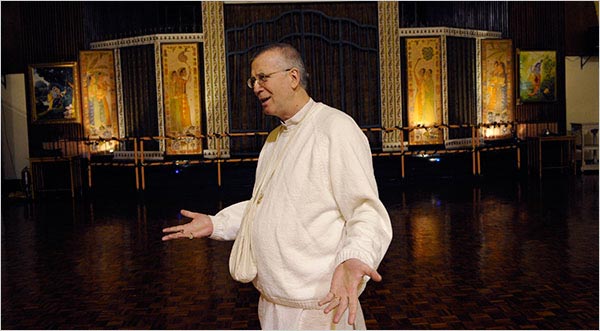When the Ascetic Life Looks Like a Smart Financial Move
By C. J. Hughes | Dec 27, 2008

Under the no-stone-left-unturned set of new taxes, fines and fees proposed on Tuesday by Gov. David A. Paterson to help balance the budget, a Château Lafite or a Budweiser could soon cost more to sip.
But David Britten isn’t concerned.
As a matter of faith, Mr. Britten, 58, who is better known as known as Rama Dass [sic], the spiritual leader of the Hare Krishna temple in Downtown Brooklyn, doesn’t drink alcohol.
He also doesn’t smoke cigars, so no extra 50 cents per stogie. And those deli-ubiquitous drinks that may have the color of cherries but little in the way of actual fruit? That the state wants to slap an 18 percent tax on? Clear there, too.
“Hare Krishnas don’t ban them,” he said. “I just stopped drinking them for nutritional reasons.”
With New Yorkers potentially on the line for 137 new or increased taxes and fees touching all manner of vices, diversions and services — including beer, wine, cigars, sugared drinks, music downloads, fishing licenses and haircuts — it may be hard to find anybody unaffected by the governor’s sweeping proposals.
But for a few monastic New Yorkers — for whom asceticism is a virtue and courtside seats at a Knicks basketball game taboo (yes, the tickets would also be taxed) — life might go on more or less as usual.
“If we want exercise, we walk, to meditate,” said Changwu Shi, 49, a Chinese Buddhist nun who lives at the Ch’an Meditation Center in Elmhurst, Queens. “But we don’t watch sports for entertainment.”
Nor do they watch TV, which would help Ms. Shi save in the event that cable service is taxed, also part of the plan.
Her shaved head obviates the need for any beauty-salon coiffures, another target for a state tax, on top of the one New York City already imposes.
And though the sales-tax exemption on clothes that cost less than $110 could vanish, Ms. Shi isn’t concerned; her billowy gray-cotton robes are custom made in Taiwan and donated.
But other, taxable versions could soon appear in couture shops.
“I was walking in Manhattan and somebody in the fashion industry asked me if he could borrow it to study it, to make some of his own,” she said. (She agreed to lend him a robe.)
All of Ms. Shi’s meals are vegetarian, in accordance with Chinese Buddhism. Vegetables for these meals are usually donated from members’ gardens, though Ms. Shi acknowledges an occasional supermarket visit.
The Rev. Richard Roemer, 39, the director of the Roman Catholic Franciscan Friars of the Renewal in the Melrose section of the Bronx, on the other hand, never spends a penny on food.
All of what he eats is donated to the group, which tries to emulate the poverty experienced by Jesus Christ. That means no movies, no video games and no gym memberships, which could translate into big savings, relatively speaking, if the Legislature approves the budget.
“We might shop sometimes for the poor but never for us,” said Mr. Roemer, who also does not drink or smoke.
And the taxi tax shouldn’t present too many problems; if he needs to go to Manhattan, Mr. Roemer will hop on a subway. (Unfortunately, while the governor will not tax mass transit, the Metropolitan Transportation Authority approved a fare increase this week.)
There is the issue of the friars’ donated car (a Toyota Tercel from sometime in the 1990s), which he occasionally drives. The fee to renew Mr. Roemer’s license could jump 25 percent. Gasoline taxes could rise, too.
“It makes me feel sorry for people who have a lot of luxuries,” he said. “These kinds of issues remind me how grateful I am to live a simple and poor life.”
What’s unclear, though, is how some of the proposed taxes might trickle down.
Consumers could take a hit for regulatory fees imposed on the state’s utilities. In that case, Mr. Britten could see his Con Edison bill rise, say, for the two high-pressure sodium lamps that regularly illuminate the lotus-position resin likeness of Srila Prabhupada, the founder of the Hare Krishna movement, in his temple’s main room.
Then again, the lamps don’t generate a lot of heat, so air conditioning, which can suck a lot of electricity, is not required.
And what about increasing seed-dealer licensing fees? Will they translate into higher prices for the garlands of red and yellow roses that every day are placed around the statue’s neck?
Mr. Britten won’t lose sleep over it.
“The more you don’t have to deal with anything imposed upon us by material engagement,” he said, while standing by the statue, his hands clasped behind his back, “the more you can relieve yourself of stress.”
A version of this article appeared in print on December 20, 2008, on page A21 of the New York edition.















